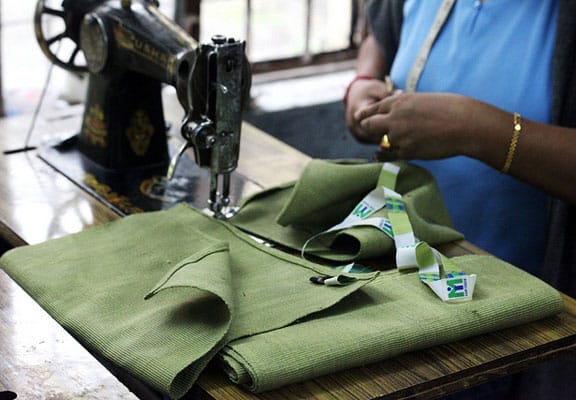

Credit: Erik Törner, IM Individuell Människohjälp, www.manniskohjalp.se, on Flickr, under Creative Commons
(WOMENSENEWS)–The stats are haunting: There are 32 million slaves in the world today– more than at any time in history, including even during the trans-Atlantic slave trade.
Approximately 70 percent of the 32 million is attributed to labor trafficking. It is in the shirt you buy and the building you live in.
You might not realize it’s in the latte you drink because the person selling you the Starbucks beverage is being paid relatively well and receiving health benefits.
However, if you were to take a closer look at the supply chain all the way back to the producer, that might not be the case. Coffee is produced with forced labor in Ivory Coast and Latin America, finds the U.S. Department of Labor, and with child labor in Colombia, Ivory Coast, Dominican Republic, Guatemala, Guinea, Honduras, El Salvador, Kenya, Mexico, Nicaragua, Panama, Sierra Leone, Tanzania and Uganda.
It is highly probable that your latte has some form of exploitation because before it gets to you, it passes through a complicated value chain where there are profit maximizers at each level.
Whether it is the company that farms the coffee bean, the processing company preparing the beans for export, the freight company that transports the beans, the export agent that ships the beans, the packaging company stateside or the trucking company that transports the coffee to your local market, there is always room for error as the profit-maximizing firms can easily hide the exploitation of their workers. When you drink your latte, it is easy to forget the lives that are on the line.
As consumers, we shouldn’t need tragedies like last year’s factory collapse in Bangladesh to wake us up and realize that what we buy matters.
Companies open up shop in countries like Bangladesh because they have weak labor standards and even weaker enforcement. The Ethical Company Organization website reveals the good, bad and the ugly of over 700 of the world’s leading brands through an app that you can download right on your phone.
Creating a Ripple Effect
New organizations, such as the Nomi Network, are creating a vital ripple effect by partnering with local organizations in India and Cambodia to put an end to sex trafficking and to empower survivors to help transform their communities.
In India, in the state of Bihar, Nomi works with a local organization called Apne Aap to identify women who they train to become leaders in fashion manufacturing and to become entrepreneurs and trainers themselves.
Sex trafficking survivors have already began mentoring women in the local red light district to produce products, educate their girls and become leaders in their communities. One of Nomi’s star trainees earns at least $3 a day for a six-hour workday, where they learn how to sew jewelry bags and pillow cushion covers that will be sold to a local Indian company. After the trainee graduates the program, she will earn almost twice as much as a trainer. That might not sound like much, but before joining the program, she earned less than 75 cents per day.
She also comes from a family that has the experience of intergenerational prostitution, but she has now told her husband that their daughter will not work in a brothel. Most importantly, with financial independence and money in their savings account, the women in the Nomi program now have the courage to even prosecute those who abused them. One trainee won a court case against her abusive husband. In the context of Bihar, a highly corrupt and unjust state, this is a rarity.
When a woman earns a viable income, she feeds and educates her children, stands up against her abusers and becomes a catalyst in her community. Her new way of making a living causes a ripple effect that reaches people far away, at the other end of the global supply chain.
Consumers can buy products that empower people instead of exploiting them simply because they were born into the wrong community. If you look around, you can find stores cooperating more and more. Within the next five years, for instance, Wal-Mart has committed to sourcing $20 billion in products by women-owned businesses and groups like Nomi Network through its Empowering Women Together website. Shoppers need to give companies like Wal-Mart and other retail giants the incentive to do more good by voting with their dollars.
Diana Mao is the cofounder of Nomi Network, a nonprofit organization that creates economic opportunities for women who are survivors of or at risk of human trafficking. Prior to launching Nomi Network (http://www.nominetwork.org and www.buyherbagnotherbody.com), Mao spearheaded a city-wide campaign to raise money and awareness for the child soldiers of Northern Uganda. She is a blogger for the Huffington Post and Reuters.
Would you like to Comment but not sure how? Visit our help page at https://womensenews.org/help-making-comments-womens-enews-stories.
Would you like to Send Along a Link of This Story? https://womensenews.org/story/prostitution-and-trafficking/140423/when-you-shop-try-leave-out-all-the-slavery


